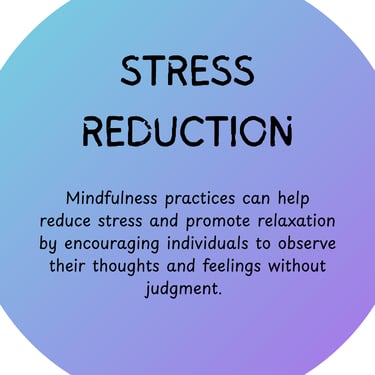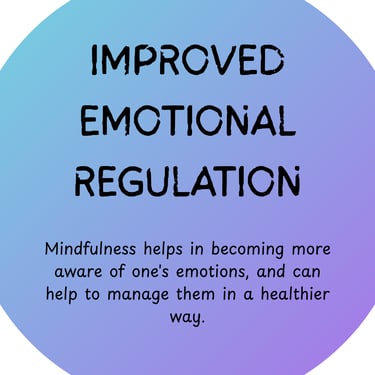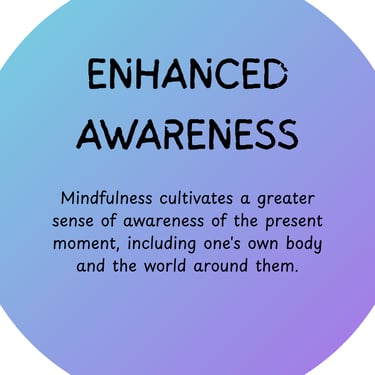Thank you to our sponsors and supporters
March 2025 Newsletter
This edition discusses how to use journaling to help support your journey
NEWSLETTERS
1/15/20255 min read
A month to be mindful
who?
Mindfulness is something everyone and anyone can use regardless of age, ability, and background.
As many of you know, the organization has been working on compiling resources for you. This includes a lending library, community information and referrals, and different assistance programs that may aid you. We are still working on the best way to sort this out and make it accessible. For now, feel free to check out our website by clicking the image below, and if you need help finding more information, send us an email at saskatoonsuicidegrief@gmail.com
Suicide Grief Support Saskatoon Inc.
24/7 Help
These resources are helplines available 24/7 to help you get through this difficult time.
9-8-8 is a national suicide and mental health crisis line. You don’t have to be suicidal to call. For more information click here.
988
For those of you based in Saskatoon, there is a service offered called Mobile Crisis - someone will take your call and work with you through the thoughts. For more information, click here.
306-933-6200
Saskatoon Mobile Crisis
The Hope for Wellness Helpline is available to all Indigenous people across Canada. Experienced and culturally aware counsellors are reachable by telephone and online chat 24/7. For more information click here.
Hope for Wellness
1-855-242-3310
This line is a dedicated line for veterans to use. It’s a part of the 9-8-8 initiative, if you’d like to call rather than text, call 988 and dial 1. For more information click here.
Text 838255
Veterans Line
Emotion of the Month:
Fear arises with the threat of harm, either physical, emotional, or psychological, real or imagined. While traditionally considered a “negative” emotion, fear actually serves an important role in keeping us safe as it mobilizes us to cope with potential danger. Too much fear can also have a negative effect on our lives.
Who experiences fear?
The majority of people experience fear. Fear isn’t only experienced during grief or trauma, but these events can bring a fear you’ve never experienced.
Why do I feel fear?
There are many reasons you may feel fear. With survivors of suicide loss, the primary fear is typically directed towards losing another person you love to suicide. You may tend to spend your time worrying about how others are coping, if they are hiding something, or you may even fear your own thoughts.
After a suicide, there’s often a layering of fear, and one of those layers is frequently a fear of the future. Everything has now been changed. Nothing is certain anymore. You’re pulled into a reality you had never imagined, and it’s a scary one
Some ideas for responding to guilt are listed here:
Mindfulness and Relaxation
Practicing mindfulness, focusing on the present moment, and using relaxation techniques like deep breathing can help calm the nervous system and reduce feelings of anxiety.
Cognitive Restructuring
Identifying and challenging negative or irrational thoughts can help you reframe your perspective and reduce the intensity of your fear.
Exposure Therapy
Gradually exposing yourself to the source of your fear in a safe and controlled environment can help you desensitize yourself and overcome your fear.
App of the Month
Finch
Imagine if that old Tamagotchi you played with as a child revolved around you taking care of yourself. In this app users take care of a bird by taking care of themselves. Once done with the onboarding process, the app allows you to add tasks everyday, create overarching goals, and motivates you to complete them. There are small activities you can complete as well within the app, such as meditation and journaling.
This app is available on both Google Play and the App Store. It’s free to play, with an optional “plus” feature.
Check out more by reading this article.


In the Meantime…
Needing more help is okay.
Grief doesn’t stop. It doesn’t only appear once a month. It’s an everlasting thing. In addition to our meetings, there are many online groups you can look at attending. Some may be specified to suicide, others may not. Here is a site that lists grief groups online.
These may not be specific to suicide
Suggestions? Feedback?
We are always looking for more information and resources. Please feel free to fill out this form:
https://forms.gle/Efe2Mb9cCrbDxXHJ8












Mindfulness
While mental health starts to become a common conversation, there’s one word that seems to constantly reappear. Mindfulness.
Mindfulness is one of the most fundamental coping skills, but also the hardest to develop. Below, we’ll answer the basic questions as well as address some of the FAQ’s people may have. After the FAQ’s you’ll see some links to files that will help you get started in your mindfulness journey.
what?
Sometimes with buzz words, the meaning gets lost or confusing. So let’s take a look at the basics. Mindfulness is used to help reduce stress, increase focus, help regulate emotions, be more aware of our surroundings, and most importantly - ourselves.
Mindfulness involves paying attention to the present moment, with intention and a sense of curiosity, while acknowledging the sensations, thoughts, and feelings as they arise without judgment.
when?
Mindfulness can be practiced at any time. With it being a skill with many different methods, it’s easy to adapt to including it in small moments throughout your day. Mindfulness is best practiced in short periods, for example you may start with a minute of mindful breathing and progress to longer periods.
where?
Just like we said in the When section, mindfulness is able to be adapted. This means you can practice this anywhere - eating, walking, or even driving. You may choose to incorporate it into your daily routine, or schedule time to practice.
To start, you may find it easier to begin by practicing while in a comforting and quiet location to help you develop the focus required.
why?
There are many benefits to mindfulness. Here’s a brief overview:
how?
The one question we haven’t answered is the How. How do we practice mindfulness? Listed below are some examples and links to ways you can apply this skill in your daily life.
10 mindfulness excersizes: Daily Routine Mindfulness
Mindfulness for Anxiety: Stress and Anxiety
Progressive Muscle Relaxation: Saskatoon Suicide Grief Support Muscle Relaxation
Using Objects to be mindful: Saskatoon Suicide Grief Support Object Mindfulness
Have more questions? Check out this FAQ: Mindfulness FAQ


Seek Professional Help:
If your fear is significantly impacting your daily life, consider seeking professional help from a therapist or counselor.
Communication:
Talking about your fears with trusted friends, family, or a therapist can help you process your emotions and gain a new perspective.
Problem-Solving:
Breaking down your fears into smaller, manageable steps can help you feel more in control and less overwhelmed.
Visualization:
Visualizing yourself successfully facing your fears and achieving your goals can help build confidence and reduce anxiety.